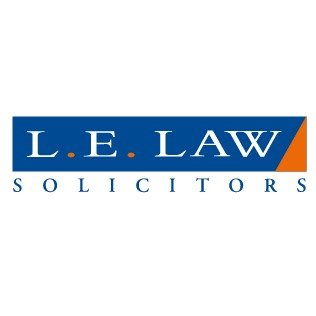Best Restructuring & Insolvency Lawyers in London
Share your needs with us, get contacted by law firms.
Free. Takes 2 min.
List of the best lawyers in London, United Kingdom
Legal guides written by Crypto Legal:
- The Evolution of Crypto Fraud in 2025: Forensic and Legal Strategies for Prevention and Recovery
About Restructuring & Insolvency Law in London, United Kingdom
Restructuring and insolvency law in London, United Kingdom, addresses the legal processes and options available when individuals or businesses face financial distress. London is a key international financial centre, and its legal system offers sophisticated mechanisms for resolving insolvency and restructuring difficulties. The law provides frameworks intended to protect creditors, rescue viable companies, and facilitate the orderly wind down of businesses that can no longer operate sustainably. These processes often require careful navigation of complex legal and financial considerations, making specialist legal advice essential.
Why You May Need a Lawyer
There are several scenarios in which you might need a lawyer experienced in restructuring and insolvency matters in London:
- If your business is struggling with debt and you need guidance on your options for turnaround or reorganisation
- If you are a creditor seeking to recover money owed by an insolvent company or individual
- If you are facing personal insolvency, such as bankruptcy, and are unsure about the process or consequences
- If you hold a directorship or management role and need to understand your duties and liabilities during financial distress
- If you wish to buy the assets of a business that is in administration or liquidation
- If you believe another party's insolvency may affect your rights, contracts or ongoing litigation
In each of these situations, a lawyer can help explain your rights and obligations, negotiate with creditors or debtors, and guide you through formal legal processes to achieve the best possible outcome.
Local Laws Overview
Restructuring and insolvency in London are governed primarily by the Insolvency Act 1986 and related regulations. Key local aspects include:
- Administration - A rescue procedure designed to protect an insolvent company from creditor action while seeking to reorganise or sell assets for the benefit of creditors.
- Company Voluntary Arrangements (CVAs) - A process allowing a company to agree with its creditors on repayment terms and avoid liquidation if accepted by the required majority.
- Liquidation - The formal winding up of a company, either through a creditors' voluntary liquidation (CVL) or compulsory liquidation by court order.
- Receivership - A process where a secured creditor appoints a receiver to take control of company assets to recover debts.
- Bankruptcy - The personal insolvency process for individuals unable to pay their debts as they fall due.
- Directors’ Duties - Directors are expected to prioritise creditors' interests when a company is insolvent or facing insolvency and can be personally liable for wrongful or fraudulent trading.
- Moratoriums - Recent reforms have introduced a free-standing moratorium to give failing but potentially viable businesses breathing space from creditors while they put together a rescue plan.
- Court Involvement - Many restructuring and insolvency actions require court approval or oversight, especially where creditor rights are affected.
Frequently Asked Questions
What is the difference between restructuring and insolvency?
Restructuring refers to efforts to reorganise a business's financial affairs or operations to restore it to profitability and avoid insolvency, whereas insolvency is the legal status of a person or business unable to pay their debts as they fall due. Insolvency can lead to formal procedures like liquidation or bankruptcy.
How do I know if my business is insolvent?
A business is typically considered insolvent if it cannot pay its debts as they become due, or if its liabilities exceed its assets. Accountants or legal advisers can help assess your financial position in light of UK insolvency tests.
What options are available to companies facing insolvency in London?
Options include entering administration, arranging a company voluntary arrangement, seeking a moratorium, or, if rescue is not viable, proceeding with liquidation. Each option has different implications for directors, creditors, and employees.
What are the consequences of personal bankruptcy?
If you are declared bankrupt, your assets (with certain exceptions) may be sold by a trustee to pay your debts. You may face restrictions on obtaining credit, operating bank accounts, and acting as a company director for the duration of your bankruptcy (typically one year).
What are a director’s duties during financial distress?
Directors must act in the best interests of creditors rather than shareholders if insolvency is likely. Failing to do so can result in personal liability for wrongful trading.
How can creditors recover money if a debtor is insolvent?
Creditors may participate in insolvency proceedings or appoint an insolvency practitioner to manage repayment. Secured creditors usually have priority over unsecured creditors in recoveries from insolvent entities.
What is a moratorium, and how does it help?
A moratorium temporarily prevents creditor enforcement actions against a company, giving it breathing space to consider restructuring options without immediate threat from creditors.
Can individuals enter into an arrangement with creditors without bankruptcy?
Yes, individuals may propose an Individual Voluntary Arrangement (IVA) to their creditors, offering repayment terms as an alternative to bankruptcy.
Who appoints administrators or insolvency practitioners?
Depending on the process, administrators or insolvency practitioners can be appointed by company directors, creditors, or the court.
How long do insolvency proceedings typically take?
The length of insolvency proceedings varies greatly. Some liquidations may take several months, while complex administrations or arrangements can last over a year. Timeframes depend on case specifics and the issues involved.
Additional Resources
Several organisations and governmental bodies provide guidance, support, and oversight in restructuring and insolvency matters in the UK:
- Insolvency Service - The government agency responsible for insolvency regulation and the administration of bankruptcies and company liquidations in England and Wales.
- Companies House - The registrar of companies, maintaining records of company administration and liquidation.
- Association of Business Recovery Professionals (R3) - A leading industry body for insolvency, restructuring, and turnaround specialists, offering useful information and directories.
- Citizens Advice - Provides free, impartial advice to individuals and small businesses facing debt and financial stress.
- Law Society of England and Wales - Helps people find qualified solicitors specialising in insolvency and restructuring.
Next Steps
If you are facing financial distress or need advice about restructuring and insolvency in London, it is important to act promptly. Here are recommended next steps:
- Gather all relevant financial and legal documents, including accounts, contracts, and correspondence.
- Prepare a summary of your financial position, including assets, liabilities, and cash flow information.
- Seek specialist legal advice from a qualified restructuring and insolvency lawyer or a licensed insolvency practitioner as soon as possible.
- Be honest and open with your advisers to ensure you receive accurate guidance tailored to your circumstances.
- Familiarise yourself with your duties and obligations under UK law to avoid potential personal liability.
- Consider contacting one of the additional resources listed above for free guidance or information.
Navigating financial difficulties can be challenging, but expert legal support can help you understand your options and make informed decisions at every stage of the process.
Lawzana helps you find the best lawyers and law firms in London through a curated and pre-screened list of qualified legal professionals. Our platform offers rankings and detailed profiles of attorneys and law firms, allowing you to compare based on practice areas, including Restructuring & Insolvency, experience, and client feedback.
Each profile includes a description of the firm's areas of practice, client reviews, team members and partners, year of establishment, spoken languages, office locations, contact information, social media presence, and any published articles or resources. Most firms on our platform speak English and are experienced in both local and international legal matters.
Get a quote from top-rated law firms in London, United Kingdom — quickly, securely, and without unnecessary hassle.
Disclaimer:
The information provided on this page is for general informational purposes only and does not constitute legal advice. While we strive to ensure the accuracy and relevance of the content, legal information may change over time, and interpretations of the law can vary. You should always consult with a qualified legal professional for advice specific to your situation.
We disclaim all liability for actions taken or not taken based on the content of this page. If you believe any information is incorrect or outdated, please contact us, and we will review and update it where appropriate.

















